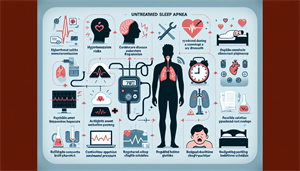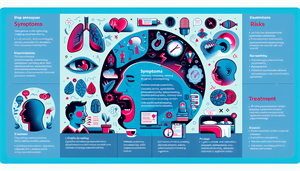
Understanding Untreated Sleep Apnea Life Expectancy
Imagine spending every night in an invisible battle, fighting for each breath, never truly resting. This is the reality for millions of people with sleep apnea. A good night’s sleep is not just a luxury, it’s a necessity for our bodies to function optimally.
Yet, a serious sleep disorder like sleep apnea can disrupt this vital process, leading to severe health risks and a potential decrease in untreated sleep apnea life expectancy if left untreated.
Sleep apnea is a condition that merits serious attention, not just for the distressing symptoms it presents but also for its potentially disastrous health consequences.
It’s a silent assassin, working in the dark, stealthily chipping away at your health. The grim reality is, untreated sleep apnea life expectancy can be shortened, making it all the more critical to understand this condition and seek appropriate treatment.
Key Takeaways
-
Untreated sleep apnea significantly increases the risk of mortality, cardiovascular diseases, and other health issues, with severe cases potentially doubling the risk of death compared to treated cases.
-
Effective treatment for sleep apnea, including CPAP therapy, oral appliance therapy, and surgical interventions can manage symptoms, reduce health risks, and possibly extend life expectancy.
-
Lifestyle changes, such as maintaining a healthy weight, engaging in exercise, practicing breathing exercises, and adjusting sleep positions, can contribute to managing and improving sleep apnea symptoms.
The Grim Reality of Ignoring Sleep Apnea
Sleep apnea, an all too common sleep disorder, carries with it a grim reality. It poses a silent threat, often going undiagnosed as people dismiss their symptoms as merely poor sleep or daytime sleepiness. Yet, leaving sleep apnea untreated can lead to severe health consequences and a substantial reduction in life expectancy. Studies have shown that this condition increases the risk of death by 17%, and in severe cases, untreated sleep apnea could double the risk of death compared to those who treat their sleep apnea.
Life expectancy can be significantly influenced by the severity of sleep apnea. If left untreated, especially severe cases, it can result in long-lasting health issues like: heart and organ damage, high blood pressure, stroke, and heart failure.
Older adults with untreated sleep apnea face a 38% higher risk of heart failure. Yet, there’s hope on the horizon. Properly treating sleep apnea can decrease the stroke risk by half and quintuple the odds of avoiding heart attacks, in contrast to those cases left untreated.
The Connection Between Sleep Apnea and Mortality
Exploring the link between sleep apnea and mortality reveals sobering figures. Here are some key statistics: Life expectancy can be diminished by over a decade if sleep apnea remains untreated. Sleep apnea increases the risk of death by 17%.
Severe cases of sleep apnea left untreated could double the risk of death compared to those receiving treatment.
A 20-year follow-up study revealed the following findings on sleep apnea: There is a four-fold increase in the mortality rate among people with sleep apnea, including both moderate and severe cases, as well as obstructive and central sleep apnea. Individuals with sleep apnea are, on average, 74% more likely to experience mortality from any cause compared to those without the disorder.
People with severe sleep apnea are at an alarming risk of cardiovascular disease, which is the leading cause of death among this group. This underscores the importance of effectively managing sleep apnea to reduce the risk of cardiovascular complications.
How Sleep Apnea Affects Longevity
Sleep apnea does not only disrupt sleep but life itself. The condition is associated with: an increased risk of developing insulin resistance, type 2 diabetes, and metabolic syndrome, obesity.

